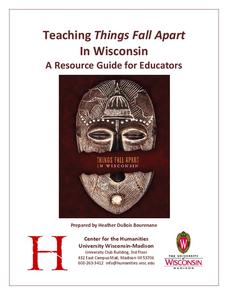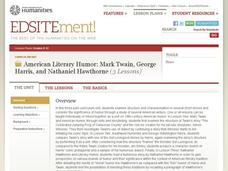Teacher's Corner
Diamonte (dee-a-MON-tay)
Did you say a diamonte? Ask your young poets to craft and polish this gem of a form poem. The fifth in a series of ten poetry writing exercises.
University of Wisconsin
Teaching Things Fall Apart in Wisconsin: A Resource Guide for Educators
“There is no story that is not true, . . .” And uncovering the truths in Things Fall Apart is the focus of a 68-page resource packet designed to provide instructors with a wealth of materials that enhance understanding of Chinua Achebe’s...
National Endowment for the Humanities
Arabic Poetry: Guzzle a Ghazal!
Learners research the evolution and cultural significance of the Arabic ghazal form of poetry. They, in groups, compose an original ghazal poem and read it aloud to the class.
Curated OER
Identifying and Using Parallelism and Balance in Literature
Analyze the use of balanced sentences and parallelism in a narrative. Included in this resource is a narrative about serving as a Peace Corps volunteer in Kazakhstan titled, "The Train Ride Home". Middle and high schoolers review...
Curated OER
Frankenstein
Share a classic novel with your class using this resource. After reading Frankenstein by Mary Shelley, learners answer questions involving the narrator's point of view, make and confirm predictions, and sequence events in the story.
Student Achievement Partners
Jacob and Wilhelm Grimm - "The Fisherman and his Wife"
Help young readers learn to read and interpret complex text independently. Teach young children to ask interpretive questions and use the text itself to answer them. Use art, word play and drama to provide a deeper understanding of...
Curated OER
Reflexive Verbs
Reflexive verbs and pronouns are a breeze with this reference guide! Explanations and examples are provided, and the chart is well-organized for easy understanding. Now provide your learners with an opportunity to put this knowledge to...
Curated OER
Who Would Win? Killer Whale vs. Great White Shark Storia Teaching Guide
Teacher guides are wonderful tools with tons of ideas that help you relate content in many different ways. Using the high-interest book, Who Would Win? Killer Whale vs. Great White Shark, learners hone their discussion and reading...
Curated OER
Flavors Of The World
Students engage in a simulation/role play. They analyze information about flavors and ingredients that create a unique flavor of a culture. They make recommendations to the executive chef on menu items appropriate for international buffet.
Curated OER
The Beginning of the War -- Two Views on Texas
Young scholars discuss the factors that can lead to war, and the motivations of countries going into war. They research two viewpoints on Texas during the Mexican War and participate in a debate with their classmates.
Curated OER
Spring into Poetry
How many different types of poetry are there? Let me count them; list poems, haiku, and makes-me-think poems are only a few. Learners create their own poems accompanied by artistic projects such as haiku poems written on kites.
Curated OER
Working on the Slant
Compare and contrast a major news story from various newspapers. How does the perspective change? Are certain things included in some of the stories and left out of others? Have pupils complete a graphic organizer to compare how...
National Endowment for the Humanities
American Literary Humor: Mark Twain, George Harris, and Nathaniel Hawthorne
Nathaniel Hawthorne as a humorist? Really? The three lessons in this series focus on the the storytelling style, conventions, and literary techniques employed by Hawthorne, George Washington Harris, and Mark Twain.
Curated OER
"Take my Advice": Poems with a Voice
Discuss the meaning of the phrase tone of voice with the class. They respond to a variety of scenarios where a particular tone would be prevalent. They then read "Mother to Son" without knowing the title and answer some questions about...
Curated OER
What is the Setting of a Story?
First graders explore the concepts of what setting is and how it's determined in a story. They play the KidWorks program to help facilitate the setting in a story. They use resources such as a picture dictionary or word wall to find and...
Curated OER
ABC-Introduction to the Dictionary
Looking for an excellent way to give your class practice using and a better understanding of how the dictionary works? Try this 4 page printable packet! They read about the dictionary, sort and alphabetize words, the create a dictionary...
Curated OER
Cross Out Paragraph Puzzle One: To Keep it Secret
Slightly confusing upon first glance, this lesson is actually a neat idea! Present your learners with a series of sentences (at the top of the page), and have them follow the directions to cross out adverbs, verbs in the past tense, etc....
San José State University
Semicolons
This worksheet provides a good description of when to use a semicolon, followed by 6 sentences to practice inserting punctuation. A key is provided.
Curated OER
Shakespeare Limericks 2
These fun limericks all point to a Shakespeare play. You fill in the blank with the title of the play each limerick points to. A creative way to get your readers thinking!
Curated OER
How to Set Out an Informal Letter
Walk your class through each step in writing an informal letter. This fabulous PowerPoint provides a great example for all parts of an informal, or personal, letter. After reviewing this presentation, your class will be ready to write...
Curated OER
The Mighty Apostrophe
Here is a well-designed presentation on apostrophes and their many uses. The apostrophe is used in many different ways, and this PowerPoint does a great job of showing how it's used. There is a nice interactive component built in, and...
Curated OER
Latin Roots: dict, vent, duct (Advanced)
Such a comprehensive way to learn vocabulary! Complete the puzzle, read the vocabulary in context, and get a thorough definition for each vocabulary word. This resource focuses on words containing three Latin roots: dict, vent, and duct.
Curated OER
Interrogatives
Use this resource to provide your beginning Spanish speakers the opportunity to ask questions. Then have pairs read the questions and answers aloud.
Curated OER
Ir+a+the Infinitive Form of the Verb
With the ir verb, meaning to go, Spanish speakers can also say "I am going to..." Complete two quick exercises to show them the different use ir can have.

























